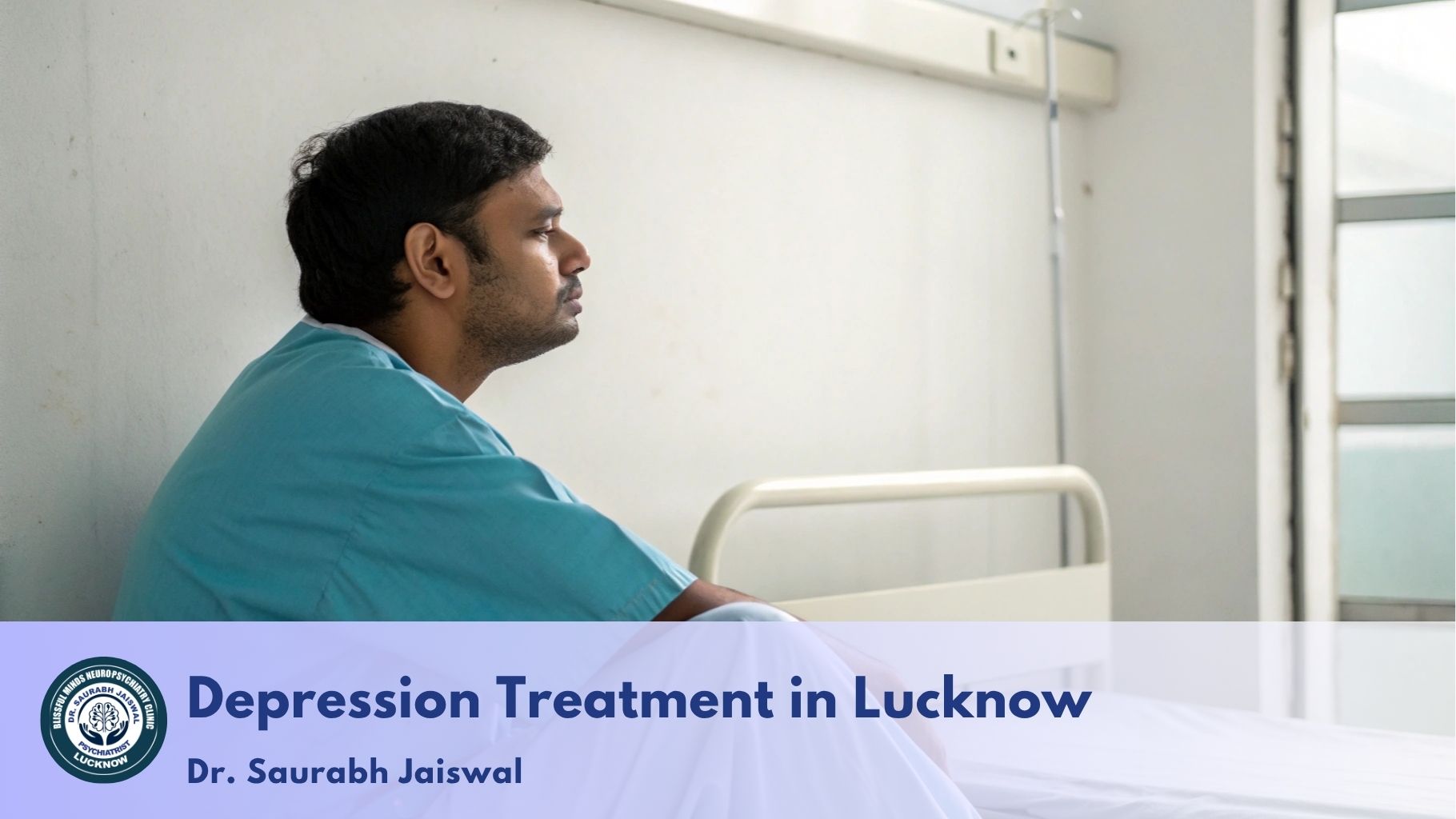
While Lucknow is a vibrant city, the fast-paced life in areas like Gomti Nagar often leads to hidden stress. Mental health issues like depression are becoming common, yet many hesitate to seek help due to stigma. As a leading psychiatrist in Lucknow, Dr. Saurabh Jaiswal aims to break these barriers. We offer kind, professional, and science-based care for those facing depression, designed to meet the unique needs of each person. At Dr. Saurabh Jaiswal Clinic, every treatment is designed to meet the unique needs of each person.
Depression is a mental health condition that deeply affects a person’s mood. It causes long-lasting sadness and a loss of interest in things that once felt enjoyable. This condition is also known as clinical depression or major depressive disorder.
Depression can influence how you feel emotionally, how you think, and how you act in daily life. Simple tasks may start feeling difficult, and at times, a person may feel hopeless or question the value of life.
Depression is not the same as feeling low for a few days. It is not a sign of weakness, and it cannot be fixed just by “thinking positive.” It is a real medical condition that often needs proper care and treatment.
Depression does not happen due to one single reason. Many different factors can play a role in its development, such as:
When looking for help with depression in Lucknow, our clinic offers trusted care and a personal touch. Here's why patients choose us:
Recognizing the signs of depression is the first step toward feeling better. Here are the most common symptoms:
If you or someone you care about has these symptoms for more than two weeks, don’t wait. Get help. At our Lucknow clinic, we offer expert check-ups and create a plan to help you recover.
Depression is not the same for everyone. There are different types, each with its own symptoms and treatments. At Dr. Saurabh Jaiswal’s Clinic, we treat a wide range of depression types with care and expertise.
Also called clinical depression, this is the most common type. Symptoms include intense sadness, low energy, loss of interest, and possible thoughts of self-harm.
Earlier called dysthymia, this is a long-lasting type of depression. It causes low mood, poor energy, and low self-esteem.
This involves mood swings between depression and mania. Manic episodes include high energy and risky behavior. We treat it with mood stabilizers and therapy.
Happens in winter due to low sunlight. People feel sleepy, eat more, and feel low. We treat SAD with light therapy, medication, and counseling.
Seen in new mothers (and sometimes fathers), it causes sadness, anxiety, and bonding issues. We provide safe medications and emotional support for parents.
This severe type includes hallucinations or delusions along with depression. Our treatment includes antidepressants, antipsychotics, and therapy.
PMDD causes mood swings and sadness before periods. We use hormone treatment, antidepressants, and healthy lifestyle changes to help.
Seen in kids and teens, this causes frequent anger and outbursts. We offer behavior therapy and child-safe medication to help them feel better.
At Dr. Saurabh Jaiswal Clinic, our expertise in diagnosing and treating these types ensures personalized care, addressing the unique needs of each patient in Lucknow’s cultural and environmental context.
Getting help for depression is easier than you think. At Dr. Saurabh Jaiswal Clinic in Lucknow, the process is simple and supportive. Here's how to get started:
Ready to Begin? Take the first step toward feeling better. Book your appointment with Dr. Saurabh Jaiswal, a trusted psychiatrist in Lucknow. Your mental health is important—and you don’t have to face it alone. Let us help you on your path to a brighter and healthier life.
Depression can manifest in various ways, including persistent sadness, loss of interest in activities, fatigue, changes in appetite or sleep patterns, difficulty concentrating, feelings of worthlessness, and in severe cases, suicidal thoughts. If these symptoms persist for more than two weeks, seeking professional help is crucial.
A mental health professional in Lucknow, such as a psychiatrist or psychologist, can diagnose depression through a detailed evaluation, including a clinical interview, symptom assessment, and sometimes psychological tests. The diagnosis is based on established criteria in the DSM-5 (Diagnostic and Statistical Manual of Mental Disorders).
Treatment options for depression in Lucknow include psychotherapy (such as Cognitive Behavioral Therapy or Interpersonal Therapy), medication (antidepressants), lifestyle modifications, and in severe cases, brain stimulation therapies like Electroconvulsive Therapy (ECT) or Transcranial Magnetic Stimulation (TMS). The best approach depends on the severity and type of depression.
Yes, Lucknow has several qualified psychiatrists, psychologists, and counselors specializing in depression treatment. Major hospitals, mental health clinics, and private practitioners offer professional support. Online therapy options are also available for those preferring remote consultations.
Yes, mild to moderate depression can often be managed effectively with psychotherapy, lifestyle changes, and natural coping strategies like regular exercise, a balanced diet, stress management techniques, and social support. However, for severe depression, a combination of medication and therapy is typically recommended.
The duration of treatment varies based on individual factors. Some people see improvement within weeks, while others may require months or years of therapy and medication adjustments. Consistency with treatment and follow-up with mental health professionals in Lucknow is key to long-term recovery.
If you suspect someone is suffering from depression, offer support, encourage them to seek professional help, and be patient. Avoid dismissing their feelings or offering simplistic solutions. If they express suicidal thoughts, seek immediate medical intervention from a psychiatrist or emergency services in Lucknow.
To prevent relapse, maintain regular follow-ups with your doctor, practice coping strategies learned in therapy, stay physically active, manage stress effectively, nurture strong social connections, and adopt a healthy diet. Recognizing early warning signs and addressing them promptly is also crucial.